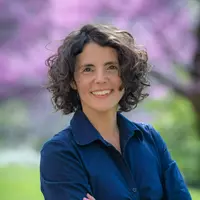A Coordinated Experiential Learning Program to Broaden Participation by Enhancing Self-Efficacy, geoSTEM Identity, and Career Awareness
Oral Session Part of
Monday B: Student Learning: Curriculum Design, Program Design, and DEI
Authors
 Meagen Pollock, College of Wooster
Meagen Pollock, College of Wooster
 Greg Wiles, College of Wooster
Greg Wiles, College of Wooster
 Missy Schen, College of Wooster
Missy Schen, College of Wooster
To broaden participation in the geosciences, we developed a coordinated program of summer internships and experiential learning courses that implement evidence-based strategies for increasing students' self-efficacy, geoSTEM identity, and awareness of geoscience careers. Our program consists of three scaffolded interventions: (1) a first-year experiential learning course focusing on professional development, (2) a summer internship for first-year students and near-peer mentors focusing on workforce skills and community partnerships, and (3) an upper-level majors experiential learning course that combines the community partnership with professional development. Interventions employ NSEE's Eight Principles of Good Practice, emphasizing authenticity and reflection. Learning goals and activities overlap, shifting in detail depending on the position within the scaffolded program. Students critically analyze their experiences through informal and formal reflections in which they consider their professional development, lived experiences, identities, and self-efficacy. Preliminary qualitative analysis of reflections suggests that students grew more confident in their abilities to overcome challenges, more likely to see themselves as geoscientists, and more favorably disposed to career paths in the geosciences. Gains differ across the interventions. First-year students in the experiential learning course showed growth in career awareness. Summer internship students showed growth in workforce skills. Upper-level majors showed growth in those areas, self-efficacy, and geoSTEM identity. In assessing geoSTEM identity, some students had a decrease in their alignment with a STEM professional identity, despite reporting stronger geoscience identities. This appeared to result from their awareness of extensive geoscience careers, varied professional skills, and other valued aspects of their identities. An important implication of this finding is that we must consider the complexity of students' intersectional identities when using and assessing identity- and professional development-centered pedagogies. Understanding effective strategies for supporting and retaining underrepresented students at predominantly white primarily undergraduate institutions has significant implications for workforce preparation and broadening participation in the geosciences.
